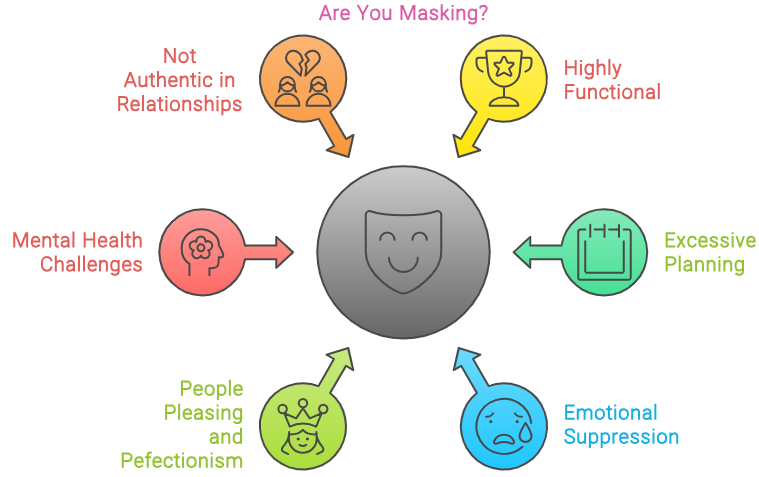ADHD Masking Quiz: Am I Masking?
Introduction
Masking is a common phenomenon among women with ADHD, where individuals consciously or unconsciously hide their ADHD traits to fit societal expectations. This behavior can lead to significant emotional and mental strain. Although symptoms of ADHD masking aren’t explicitly listed in clinical diagnostic tools, research into masking behaviors, particularly in neurodivergence, offers valuable insights into what these symptoms might look like.
Symptoms of ADHD Masking in Women

- Presenting as Highly Functional and Successful: Many women with ADHD often excel in academics and social situations, especially during childhood and early adulthood, despite underlying ADHD symptoms. This success can sometimes mask the challenges they face.
- Engaging in Excessive Planning and Organization: To compensate for difficulties with executive functioning, women with ADHD may engage in meticulous control over their daily activities, leading others to view them as overly organized.
- Experiencing Intense Emotional Outbursts in Private: Women with ADHD might suppress their emotions in public, only to release built-up frustration and overwhelm in private.
- Developing Coping Mechanisms Mistaken for Personality Traits: Behaviors such as people-pleasing or perfectionism are often adopted to manage the environment and avoid criticism, but these can be mistaken for inherent personality traits.
- Experiencing Anxiety, Depression, or Burnout: Chronic masking can lead to significant mental health challenges, including anxiety, depression, and burnout.
- Difficulty Forming and Maintaining Authentic Relationships: The continuous effort of masking can hinder genuine social connections, making it difficult to form and maintain authentic relationships.
These symptoms can vary widely and may not be present in all women with ADHD. The following quiz is designed to help you reflect on your own experiences with masking.
Am I Masking My ADHD? (Women)
Masking is a common phenomenon among women with ADHD, where individuals consciously or unconsciously hide their ADHD traits to fit societal expectations. This behavior can lead to significant emotional and mental strain. Although symptoms of ADHD masking aren’t explicitly listed in clinical diagnostic tools, research into masking behaviors, particularly in neurodivergence, offers valuable insights into what these symptoms might look like.
Instructions
For each statement, select the answer that best reflects your experiences:
- Rarely or Never (0): This almost never happens to me.
- Sometimes (1): This happens occasionally, but not consistently.
- Often (2): This happens frequently.
- Very Often (3): This is a common and persistent experience for me.
Note: This quiz is for informational purposes only and not a substitute for a professional diagnosis. If you’re concerned about ADHD, please consult a qualified healthcare provider.
Conclusion
If you resonate with many of these experiences, consider seeking professional advice. Recognizing masking behaviors is a key step to navigating ADHD more authentically.
Further Reading
Note: This masking quiz is for informational purposes only and is not a substitute for a professional diagnosis. If you are concerned about ADHD or any other mental health condition, please consult a qualified healthcare professional.
Explanation of Quiz Development
Sources Focus:
While most sources discuss camouflaging in the context of autism, they offer valuable insights that are adaptable to the ADHD context, especially in understanding masking behaviors.
Quiz Content:
The questions in this quiz are designed to reflect the general definition of camouflaging as efforts to mask traits or symptoms to appear neurotypical, adapted specifically to the ADHD experience.
Women and ADHD:
This quiz targets experiences relevant to women with ADHD, who often face unique challenges related to societal expectations and gender roles, leading to increased pressure to mask.
Impact on Well-being:
The quiz addresses the potential negative consequences of masking on mental health, such as depression, anxiety, and burnout, which are commonly linked to prolonged masking efforts.
Social and Emotional Aspects:
Questions focus on the social and emotional dimensions of masking, such as planning interactions and feeling drained after socializing, which are integral to understanding camouflaging as a social coping mechanism.
Delayed Diagnosis:
The quiz hints at the possibility of delayed diagnosis by including questions about feeling misunderstood, struggling to meet expectations, and the energy expended on masking behaviors.
Conclusion
This quiz is a starting point for self-reflection. The most recent research was consulted in developing it. If you resonate with many of these experiences, consider reaching out to a healthcare professional for a more thorough evaluation and support. Recognizing and understanding your masking behaviors is the first step toward navigating life more authentically and managing your ADHD effectively.
Call to Action
If this quiz has resonated with you, explore more resources on ADHD and learn how to navigate life authentically. Consider speaking to a specialist who can provide personalized guidance and support.




